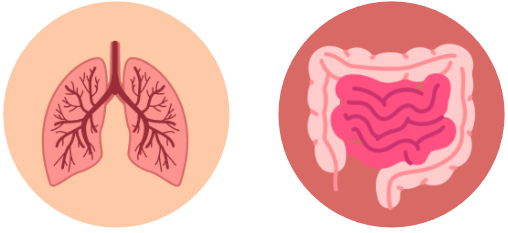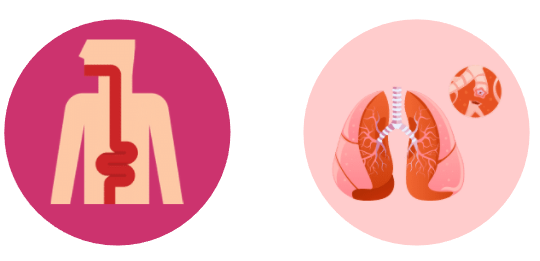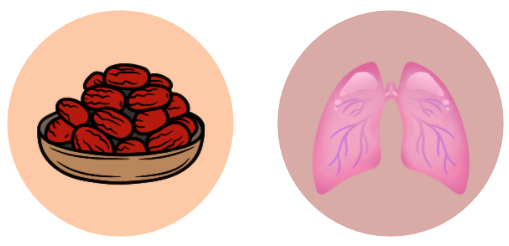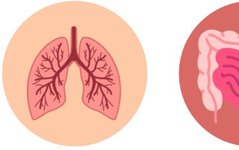
“The relationship between the Lung and Large Intestine” originates from one of the four great classics of TCM, the Huangdi Neijing (Yellow Emperor’s Inner Canon). The five organs are classified as Yin and are located internally, while the six bowels are classified as Yang and are located externally. This interplay of exterior and interior, Yin and Yang, forms the relationship between the organs.

The Lung and Large Intestine are connected through the meridians, with the Lung being an organ (zang) and the Large Intestine being a bowel (fu). The functions of the organs and bowels are interrelated. Physiologically, the organs and bowels cooperate; for example, when Lung Qi descends, it facilitates the Large Intestine’s function of transportation and the expulsion of waste. Conversely, normal transportation by the Large Intestine benefits the descent of Lung Qi. Pathologically, the organs and bowels influence each other; for instance, abnormal descent of Lung Qi can lead to poor transportation in the Large Intestine, resulting in constipation. Poor transportation in the Large Intestine can also affect the Lung’s descent, leading to symptoms such as chest tightness and coughing.

 Regulating the Large Intestine to Treat Lung Diseases
Regulating the Large Intestine to Treat Lung Diseases
When external pathogens invade the Lung or when there is insufficient Lung Qi, inflammatory pulmonary nodules may occur. Clinically, how should these be diagnosed and treated? In TCM, when the Large Intestine’s transportation function is disrupted, conditions such as excessive heat and fluid deficiency leading to dryness in the intestines can cause constipation. The Large Intestine is a Yangming bowel; when there is heat in the Yangming, the heat pathogen can ascend to the Lung, causing abnormal descent of Lung Qi, leading to symptoms such as coughing and wheezing. Wu Jutong in Wenbing Tiaobian states: “If there is shortness of breath and restlessness, with phlegm and fluid stagnation, and the right pulse is full, indicating that Lung Qi is not descending, the Xuanbai Chengqi Decoction should be used.” The Xuanbai Chengqi Decoction consists of apricot kernel powder, Trichosanthes fruit peel (gua lou pi), gypsum (shi gao), and rhubarb (da huang), and is used to treat wheezing caused by phlegm-heat. The unique aspect of this formula is the inclusion of rhubarb to treat shortness of breath by regulating the Large Intestine to address Lung diseases.

 Fluid Accumulation in the Lung and Abdominal Edema: Addressing Through the Large Intestine
Fluid Accumulation in the Lung and Abdominal Edema: Addressing Through the Large Intestine
Using purgative methods to treat fluid accumulation in the Lung. Purgation refers to using formulas that rapidly promote urination and bowel movements to treat conditions of water retention in the Lung. The Shizao Decoction from the Shanghan Lun (Treatise on Cold Damage) applies purgative methods to treat symptoms such as limb edema, cough, and shortness of breath, which are diagnosed in Western medicine as abdominal edema. The Shizao Decoction mainly consists of Euphorbia (gan sui), rhubarb (da huang), and peony flower (yuan hua), and is effective in promoting urination, eliminating accumulation, and reducing swelling. Due to the toxicity and strong properties of many of the herbs, ten dates (da zao) are added to alleviate toxicity, moderate the effects of the herbs, reduce post-medication reactions, and tonify the spleen, boost Qi, and nourish the blood.

Contributed by: Wang Yuhan
Edited by: Sheng Yu
Reviewed by: Shen Qunfang

↓ Click to view more details↓
National Breastfeeding Promotion Day | “520”, Breastfeeding

Occasional numbness may be caused by abnormal potassium levels.

National Nutrition Week | Does sugar substitute make you “sweet and healthy”?

Good news! New COVID-19 vaccines are available for vaccination in Xuhui District!



